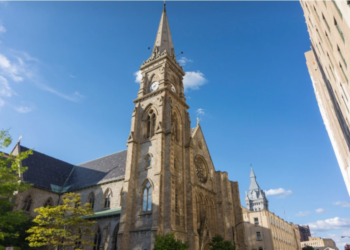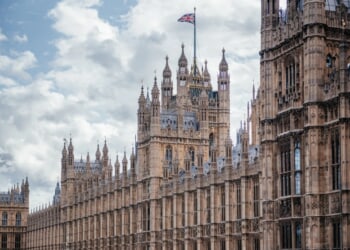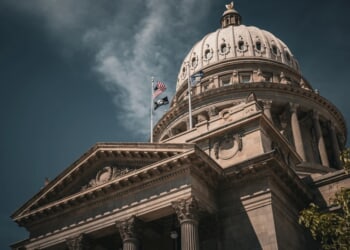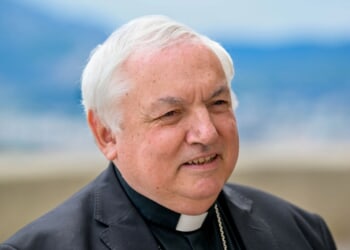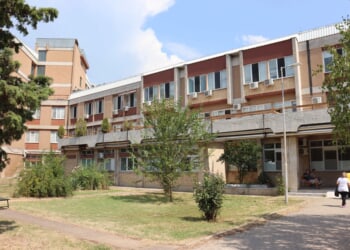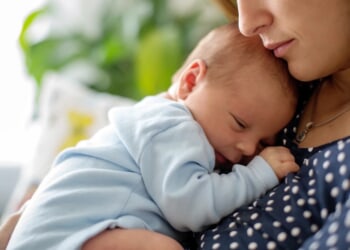Washington, D.C. Newsroom, Apr 10, 2025 /
14:01 pm
Mark Rosing has been deaf for most of his life. When he was young, he struggled to understand the homilies and readings at Mass and felt he was not getting much out of it. Eventually it became clear that despite not being able to hear, he was still able to receive what truly mattered — the Eucharist.
This past weekend, Rosing, along with his wife, Kathleen, joined more than 200 hard of hearing and Deaf Catholics from 25 states and two countries for an experience of prayer and sacraments presented in American Sign Language (ASL) at the first-ever Deaf Eucharistic Congress held at the St. Elizabeth Ann Seton Shrine in Emmitsburg, Maryland.
The congress began with a tour of the shrine where multiple ASL guides led tours around the basilica grounds for the 230 attendees — 200 of whom the Rosings believed to be Deaf or hard of hearing. Attendees gathered for Mass, confession, and speeches presented in ASL. There were 11 priests in attendance who were Deaf, hard of hearing, or hearing and fluent in sign language. They presided over all events and liturgies in ASL so that Deaf attendees could understand — which is unfortunately not a common experience for Deaf Catholics.
(Editor’s note: The Deaf community often distinguishes between being “culturally Deaf” — signified by the uppercase “Deaf” — versus losing hearing later in life).
Following the event, Mark told CNA that members of the Catholic Deaf community “definitely want more.” He said he thinks this event was “just a start” for the Deaf in the U.S. Church.
He shared that he met the organizer of the event, Father Mike Depcik, as a child when they both attended St. Rita School for the Deaf in Evendale, Ohio. Depcik, who is chaplain for Deaf Ministry in the Archdiocese of Baltimore and holds conferences and retreats for Deaf Catholics, is one of the few Deaf priests in the world. In fact, there are fewer than 10 Deaf priests serving the entire Deaf Catholic population in the U.S.
Mark said Depcik’s “message is very simple and [he makes it] easy to share with other Deaf people the importance of the Catholic faith.”
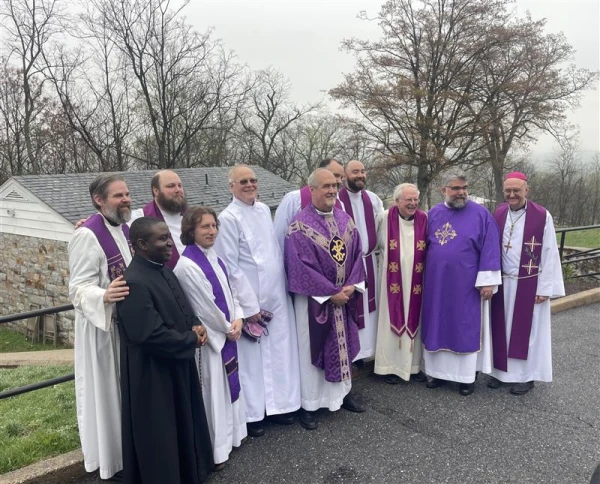
The Rosings told CNA about their experiences at the congress, which were both different as Mark has been hard of hearing and Deaf with a cochlear implant for most of his life, whereas Kathleen is hearing and not fluent in ASL.
The couple shared that in his opening talk, Depcik drew a parallel between St. Elizabeth Ann Seton’s life and the lives of those in the Catholic Deaf community. The priest shared about the hardships that Seton endured throughout her life, including the loss of her husband and numerous children.
Kathleen said that just like in the saint’s life, there has been “sadness and challenges in the Deaf Catholic life as well.”
“Some parishes reject them, and some don’t provide services,” she said. “They can’t provide services because they don’t know the ASL language, and so [the Deaf] feel alienated like Mother Seton did.”
Kathleen explained that since the congress was presented in ASL, for hearing individuals like herself there were speaking interpreters for attendees not fluent in ASL. That was a new experience.
“The tables turned for the first time for my wife,” Mark said in reference to the congress. “I’m usually in a hearing environment and I have to have an interpreter to get anything out of it.”
The first presenter at the gathering was Jeannine Adkins, a Deaf mother and grandmother who shared about how powerful the Eucharist has been in her life. “It was just very, very beautiful. I think everybody was inspired,” Kathleen said.
The conference also featured Deacon Patrick Graybill, one of the few Deaf deacons in the world. Mark has attended multiple retreats with Graybill, whom he described as a storyteller, actor, and teacher.
(Story continues below)
Subscribe to our daily newsletter
There were also deacons and seminarians at the congress who Mark said are “learning ASL to better cater to deaf Catholics in the future.” He said they “see a need in the ministry for the Deaf and [those] being deprived of these services.”
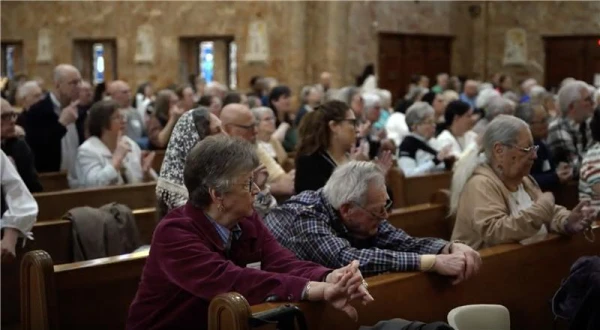
The couple explained that in the United States, most parishes do not offer services for the Deaf. This includes Mass but also receiving other sacraments. Mark shared that Deaf Catholics are not easily able to receive the sacrament of confession due to a lack of priests who know sign language.
“When we feel comfortable to go to a priest who understands the language that we feel and express, they can really see the hurt and pain that many Deaf people feel,” Mark said. He continued that Deaf individuals “need to feel loved, they need to feel accepted, they need to feel that they are forgiven.”
Kathleen added: “I just don’t think the Catholic Church in general realizes how Deaf Catholics are lacking in many of the things that other Catholics take for granted.”
Mark recalled a conversation he had with his father as a young boy. Mark said he told his father: “‘I can’t hear what they’re saying in the homily.’ And my father simply said: ‘What’s the most important thing in the Mass when we go?’ At the age of 13, I understood that the Eucharist was the most important.”
Mark explained that when he attends Mass now, he goes over the readings ahead of time so he is “prepared and aware.” Then, he said, “I accept whatever I can hear or get out of the homily.”
“I don’t think I usually get a whole lot out of homilies because I’m not familiar with the priests or the presenters’ voices, but I’m not particularly upset by that,” he said. “I do focus on receiving the Body, and that’s what I’m there for, to receive Jesus, be close to Jesus, and bring Jesus to my life and how I can share that with other people. That’s the ultimate goal.”
The couple isn’t sure if there will be another Deaf congress, but, Kathleen said, “there was the consensus from people in attendance that they are hoping we see it again.”
Mark added: “There’s a cry of the poor — in this case, the Deaf are really hungry.”




